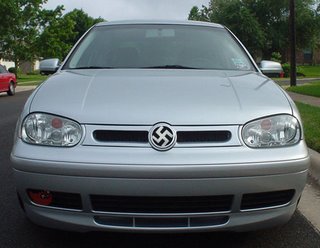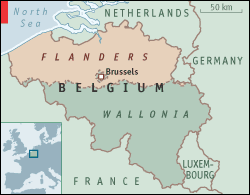I had a stopover in Delhi on the way back from China a few years ago. Driving into the city centre from the airport the taxi driver asked how long I planned to stay in his country.
"A day", I told him.
"One day", he spluttered, "for the whole of India? Its not enough time".
I have been living in Belgium for close to 4 years now. Sufficient, you may think, to get a good understanding of the country that put the be into benelux. I would have to beg to differ. It may be about the same size as a large postage stamp (the scale on the top of a map of Belgium probably reads 1:1) but it is impossibly complex.
There are seven parliament's for example. The House of Representatives, the Senate, a Parliament for Flanders, one for Wallonia, another for Brussels, a sixth for the German speaking stamp edge in the east, and finally one for the French speaking community, which appears to be to link the French speakers of Wallonia and those in Brussels (French speaking but surrounded by Flanders). Quite how these institutions interact with each other is anyone's guess. Not even the Belgian's seem entirely sure. The only certain thing is that it has led to an incredible complication of all aspects of daily life. Parliament's exist to legislate, so you do the math.
In July of 2003 , young Flemish politician Vincent Van Quickenborne was appointed Secretary of State for Administrative Reform/Simplification. His task: cut red tape, make the country comprehendable. Van Quickenborne enthusiastically took up the challenge, announcing several initiatives aimed at 'ridiculous regulations and pointless pedantry'. His department launched the website
www.kafka.be to track progress. Claiming (as of August 2006) that the job is 82% done, it contains such gems as the Kafka Index and 'Absurdity of the Month'.
By far the greatest innovation of the campaign, however, came when Van Quickenborne decided that he needed to set a personal example: he would call himself Q. The man decided to simplify his own name. James Bond fan's may consider it sacrilege but you can follow Q's exploits on:
http://www.staatssecretarisq.be/If the Belgian's can barely get to grips with their own country, what chance does the outsider have? If the question appears rhetorical, that is because it is. The outsider is shafted. Without hope. Puzzled. Bemused. Lost. Literally.
When we moved here 4 years ago, we hired a removal company to transport our few possessions to our temporary residence in the outskirts of Brussels. As he loaded the last bits and pieces into the van, we gave the poor man directions for when he arrived in Belgium.
"You'll be arriving from the South, so take the ring of Brussels, direction Antwerp, exit for Liege", we explained, forgetting that the Israel Palestine conflict is probably less intractable than the fight over what language should be used on road signs around Brussels.
"Righty O", he chirped, " see yiz on Tuesday so, about 4ish".
6 o'clock Tuesday evening. Still no sign of our belongings.
6.15. Nothing.
6.30.
6.45. The phone rings. "What the f*ck is going on?" screamed the clearly panicked voice on the other end, "I have been around this f*cking ring so many times I'm beginning to get dizzy".
"Calm down, calm down" we chorus, like a couple of scouse anger management therapists, "where are you?"
"If I knew that, I wouldn't be f*cking calling you."
"Just tell us what you can see on the signs."
"Well, I was heading towards the exits for L-i-e-g-e, but then it just f*cking dissappeared. Now I am going towards some place called L-u-i-k!"
"It is the same place".
"Don't be taking the piss out of me now, I'm really not in the mood".
"We're not, just follow Luik, then take the first exit for a place called Sterrebeek".
"Don't hang up on me", he screamed, clearly believing at this stage that he would rather have taken his chances with the Bermuda Triangle.
"We're here, don't worry. Just follow L-u-i-k, everything will be fine".
Some Belgian cities are easily identifiable in both Flemish and French: Genk is Genk no matter which way you look at it. Brugge and Bruges are not too disimilar. You shouldn't get too confused between Brussel and Bruxelles. Most, however, are less readily comparable and around Brussels where you are moving between French, Flemish and bilingual areas, this is crucially important. Antwerpen = Anvers. Gent = Gand. Mons = Bergen. And, of course, Liege = Luik.
As he rolled up the driveway, 15 minutes later, mobile phone still pressed firmly to his ear, he stammered, "that f*cking k-e-t-t-l-e better be on".








